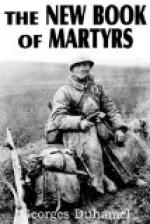Rashid had thought of everything, and this was why he went in search of Monet and Renaud, Catholic priests and ambulance orderlies of the second class.
The meeting took place at the foot of the great staircase. Leaning over the balustrade, I listened, and watched the colloquy of the rival gods.
Monet was thirty years old; he had fine, sombre eyes, and a stiff beard, from which a pipe emerged. Renaud carried the thin face of a seminarist a little on one side.
Monet and Renaud listened gravely, as became people who were deciding in the Name of the Father. Rashid was pleading for his dead Arab with supple eloquence, wrapped in a cloud of tobacco-smoke:
“We cannot leave the Arab’s corpse under a wagon, in the storm. ... This man died for France, at his post. ... He had a right to all honours, and it was hard enough as it was that he could not have the obsequies he would surely have had in his own country.”
Monet nodded approvingly, and Renaud, his mouth half open, was seeking some formula.
It came, and this was it:
“Very well, Monsieur Rashid, take him into the church; that is God’s house for every one.”
Rashid bowed with perfect deference, and went back to his dead.
Oh, he arranged everything very well! He had made this funeral a personal matter. He was the family, the master of the ceremonies, almost the priest.
The Algerian’s body accordingly lay in the chapel, covered with the old faded flag and a handful of chrysanthemums.
It was here the bearers came to take it, and carry it to consecrated ground, to lie among the other comrades.
Monet and Renaud were with us when it was lowered into the grave. Rashid represented the dead man’s kindred with much dignity. He held something in his hand which he planted in the ground before going away. It was that crescent of plain deal at the end of a stick which is still to be seen in the midst of the worm-eaten crosses, in the shadow of the belfry of L——.
There the same decay works towards the intermingling and the reconciliation of ancient symbols and ancient dogmas.
XV
Nogue is courageous, but Norman; this gives to courage a special form, which excludes neither reserve, nor prudence, nor moderation of language.
On the day when he was wounded, he bore a preliminary operation with perfect calm. Lifting up his shattered arm, I said:
“Are you suffering very much?” And he barely opened his lips to reply:
“Well ... perhaps a bit.”
Fever came the following days, and with it a certain discomfort. Nogue could not eat, and when asked if he did not feel rather hungry, he shook his head:
“I don’t think so.”
Well, the arm was broken very high up, the wound looked unhealthy, the fever ran high, and we made up our minds that it was necessary to come to a decision.




